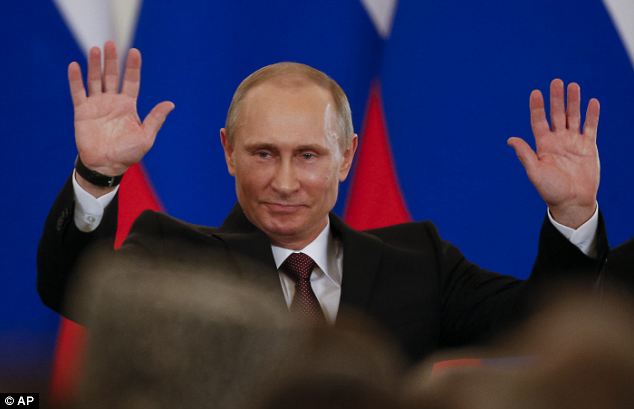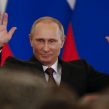
Putin’s Conveniently Imperfect Memory
Publication: Eurasia Daily Monitor Volume: 12 Issue: 58
By:

The Kremlin press service announced last week that President Vladimir Putin would not celebrate the 15th anniversary of his first election, which occurred on March 26, 2000 (RBC.ru, March 26). Indeed, many murky circumstances cloud his improbable arrival to the summit of power as Boris Yeltsin’s hand-picked successor, which he probably does not wish to reflect upon at present; the image of his omnipotent leadership needs to remain spotless. So instead, Putin opted to mark the day with an address to the board of the Federal Security Service (FSB), in which he revealed that Western special services were already planning actions to destabilize the internal situation in Russia during the parliamentary elections in 2016 and presidential elections in 2018 (Rossiiskaya Gazeta, March 26). One issue that Putin did not find opportune to mention was the murder of his defiant liberal opponent Boris Nemtsov, exactly a month prior, right under the shadow of the Kremlin’s towers (Moscow Echo, March 27).
The investigation of this meticulously planned and professionally executed crime has stalled as the inconsistencies in the officially established “Chechen connection” have mounted, while Ramzan Kadyrov, the despotic ruler of Chechnya, has made it clear that his lieutenants were off limits for Russian law (Kommersant, March 27). If Putin was angry at his security services for letting such demonstrative political “punishment” happen (as some leaks suggested), he has swallowed that feeling (Grani.ru, March 23). Disappearing from public view for ten days, he attracted much anxious attention to his indispensable dominance over Russian politics. The re-appearance was supposed to dispel any further doubts about the firmness of his “manual control” (Forbes.ru, March 25). In order to reinforce the message, he even ordered snap military exercises of unprecedented scale—but chose not to personally attend any of the well-advertised war games (Ezhednevny Zhurnal, March 24).
Normally, Nemtsov would have been forgotten as an irrelevant episode in the epic story of Putin’s remodeling of Russia’s society, but he has not been. The improvised memorial on the bridge where he took his last breath was first vandalized and then dismantled under the cover of night, but flowers and candles have stubbornly reappeared (Moskovsky Komsomolets, March 28). Putin may have at his disposal legions of police to instill fear and the propaganda machine to fan hatred, but Nemtsov had something he cannot possess: The belief that Russia has a future without Putin. Greater effort is put into sustaining the virtual mobilization for giving a “proper response to all internal and external threats to national security” (as Putin ordered)—but all this is just leading to self-isolation (Kremlin.ru, March 26). The ruling siloviki (security services personnel) have Soviet-era experience in how to suppress dissent, and they have learned the tricks of corruption under the guise of “traditional values”; but they completely lack effective management skills and see innovation as a subversive attempt to foster liberalization. The sad fiasco of the project for building a “wonder-village” of modern technologies at Skolkovo is a testimony to this phenomenon (RBC.ru, March 23).
Yet, asserting Russia’s “greatness” primarily by military means still resonates positively with public opinion, while the abandoned goals of modernization and building closer ties with Europe are not inviting any second thoughts. According to a recent Levada Center poll, as many as 68 percent of respondents are confident that Russia is a great power (compared with 47 percent in November 2011), and half of respondents see the restoration of this status as Putin’s main achievement, supporting also the view that the dialogue with the West should be conducted only from a position of strength (Levada.ru, March 23, 27). What the data also shows, however, is that support for territorial expansion has eroded, while awareness of the economic costs of Western sanctions is on the rise. Seeking to counter the deepening economic pessimism, the government is proceeding slowly with revisions of the key targets of the 2015 budget and promising to maintain the level of expenditures by tapping into financial reserves (Kommersant, March 28). It is evident for most economists, however, that the imperative political demand for maintaining priority funding for the military and rearmament results in nearly inevitable painful cuts to social programs (Moscow Echo, March 27).
Rather than dealing with this bothersome budgeting, Putin may be tempted to devote his attention to the Middle East, discussing the current spasms of multiple conflicts with Iran’s President Hassan Rouhani and Israel’s Prime Minister Benjamin Netanyahu. Moscow’s reiterated support for the creation of a Palestinian state with the capital in East Jerusalem could have been just a throwaway talking point, but the insistence on terminating military operations in Yemen can hardly gain Russia a position of mediator in that escalating conflict (RIA Novosti, March 28). A key Russian interest in the Middle East is the oil price, which has taken an upward turn with the beginning of the Saudi intervention in Yemen, and the parties to the conflict are unlikely to forget this particular driver of Moscow’s initiatives (Kommersant-FM, March 27).
Putin keeps promising that the situation will improve for Russia—but only if the country remains strong in resisting Western “containment.” This all sounds righteous and proud, but the country is in fact growing weaker—and not because of Western conspiracies but due to Russia’s incurable petro-dependency, which is aggravated by rampant corruption. Putin cannot afford for this plain truth to come to the surface from under the foam of “patriotic” propaganda, and the first signs of reckoning with the reality of sustained stagnation in the opinion polls may prompt him to resort to more than just demonstrations of military might. Real action would become necessary, and the gradual acceptance by society of the blatant lies and brutal violence of the “hybrid war” as a new normal makes it possible to plan strikes and offensives just inside the ever-rising threshold of acceptable risk. Putin is now experimenting with forgetting the risks inherent in nuclear brinkmanship. And apparently, few are firmly demanding that he remember his responsibilities as the leader of a nuclear-armed state. Those in the Kremlin who think that the “decider” has gone too far prefer to stay mum, while seasoned courtiers find it opportune to entertain the “not far enough” proposition. In this anxious crowd, his next disappearance may be for real—a risk that he is unlikely to forget.




